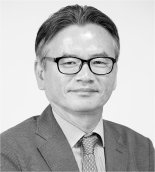[Son Seong-jin Column] Pro-business Past Presidents
- Input
- 2025-08-25 18:24:36
- Updated
- 2025-08-25 18:24:36
Lee Myung-bak as well as Rhee Syngman, etc.
Most pursued pro-business policies
Business hostility hinders national development
Most pursued pro-business policies
Business hostility hinders national development

According to economic indicators, the most pro-business government since the Third Republic was the Kim Dae-jung government, as stated in a paper ('Fiscal Policy Direction for a Happy Nation', Jo Yeon-sang). The DJ government, often criticized as anti-chaebol, achieved this result because corporate profits increased by 13.5% during that period. The good performance of companies during the DJ government was also due to the base effect after the foreign exchange crisis.
As we know, the three main economic agents are the government (president), companies, and households. The government is responsible for policies, companies for production, and households for consumption and labor supply. It is natural that they must cooperate in an inseparable organic relationship. In the history of the Korean economy, presidents and companies have been like partners, supporting and respecting each other. Although it sometimes led to the stigma of collusion between politics and business, past presidents, including Kim Dae-jung, recognized the importance of companies and showed pro-business behavior.
Rhee Syngman laid the foundation for economic revival in less than ten years after losing everything in the Korean War. He created a domestic market through import substitution industrialization and privatized state-owned enterprises, establishing the basis for Korea's market economy during his administration. Most large corporations that became the vanguard of economic growth were launched during Rhee Syngman's era. The management philosophy of Samsung founder Lee Byung-chul, 'business patriotism', which contributes to the nation and human society through business, became firm after meeting and respecting Rhee Syngman. This is mentioned in his autobiography, Hoam.
Park Chung-hee's achievements are not fully recognized due to his long dictatorship. It is no exaggeration to say that he created and nurtured the key industries that sustain Korea today, such as automobiles, shipbuilding, petrochemicals, and semiconductors. Expanding infrastructure and laying the groundwork for high growth in the 1980s is an achievement of Park Chung-hee that needs no further mention.
Park Chung-hee directly asked businessmen to execute his grand business plans. The globally dominant Korean shipbuilding industry was created from scratch by combining Park Chung-hee's special orders and the entrepreneurial spirit of companies. Without Hyundai Construction, which took on 40% of the construction, the Gyeongbu Expressway would not have been possible. Korea's world-class dairy industry was also nurtured by Park Chung-hee's directive after his visits to Australia and New Zealand.
If the first generation, who founded groups like Samsung, Hyundai, and SK, built up the Korean economy, the second and third generations have developed them into global leading companies, driving the economy. The strengths of conglomerates, such as decisiveness and speed in decision-making, are still clearly demonstrated. At the recently held 2025 World Economists Conference, Korea's conglomerates were evaluated as a unique success method that cannot be explained by Western theories.
The relationship between presidents and companies is like a strategic partnership in diplomacy. It should be that way. It is natural and fortunate that President Lee Jae-myung shows respect for companies and treats businessmen well, even if only on the surface. However, how can we explain the ruling party's actions, which push for anti-business legislation like the Yellow Envelope Law, that contradict the president's words?
The lost decade of Lee Jae-yong, chairman of Samsung Electronics, due to investigations and trials, is not unrelated to the decline in Samsung Semiconductor's competitiveness. Samsung's slump is not limited to Samsung alone. It affects national development. Who should be held accountable for this? The past opposition party's perception of companies as adversaries remains strong even after becoming the ruling party. Politics that lean towards labor unions and workers, who dominate the political scene, may ultimately kill companies.
Companies that do wrong should be punished, and the rights of oppressed workers should be guaranteed. However, as always, excess is the problem. Companies or owners are not absolute evils, and unions are not absolute goods. The government and the president should play the role of balancing between the two.
tonio66@fnnews.com